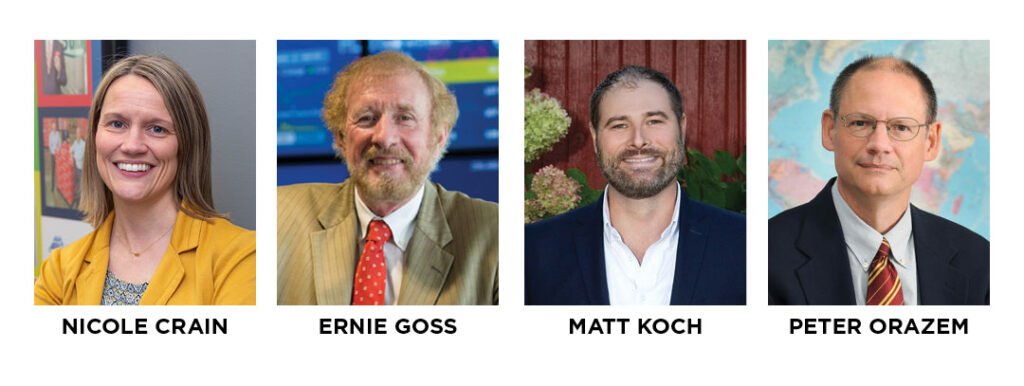Events canceled because of COVID-19 hitting tourism, entertainment industry hard
Travel, theaters and arts coping with losses as shutdown continues

MICHAEL CRUMB Apr 30, 2020 | 8:22 pm
6 min read time
1,385 wordsArts and Culture, Business Record InsiderThe economic damage caused by the cancellation of events in the Greater Des Moines area because of the spreading COVID-19 virus is about $48 million, with the effect trickling down to almost every piece of the local business community, said Greg Edwards, president and CEO of Catch Des Moines.
“The loss has been devastating,” said Edwards, whose tourism and visitors agency has seen the vast majority of the 90 groups and organizations it works with cancel their events after Gov. Kim Reynolds ordered many businesses and schools closed and restricted social gatherings to groups of fewer than 10.
The result has been canceled trade shows and conventions, concerts, plays, and many other community and cultural events that would normally draw hundreds and thousands of people to theaters, conference centers and arenas in Central Iowa.
The decline in visitors is resulting in a multi-million reduction in hotel-motel tax revenue, and fewer dollars being directed to tourism and cultural organizations that depend on it to support and promote events and organizations community-wide.
Robert Warren, executive director of Hoyt Sherman Place, said the theater was closed through April 30 following guidance from the governor’s office, but “moved all events through June,” as a proactive measure anticipating the governor’s order would be extended.
Warren said while the theater is waiting for updates, he would be surprised if anything will be scheduled before July 1.
It’s a similar tale at the Des Moines Civic Center, where staff has had to cancel programs for children for the rest of the school year and had to reschedule shows in its popular Willis Broadway Series, including a one-week run of “My Fair Lady,” now scheduled for early November.
“We’re in this place where we don’t have a lot scheduled in the next few months,” said Jeff Chelesvig, president and CEO of Des Moines Performing Arts, which includes the Civic Center and two smaller theaters. “We’re waiting. We’re not the only ones in this boat. It’s the sports teams, all live forms of entertainment, we’re all going to be affected by this.”
The cancellation of events quickly translates into lost revenue for hotels, restaurants, bars and other shops.
Chelesvig said each eight-performance week of a show in the Civic Center’s Willis Broadway Series draws between 12,000 and 20,000 attendees. In the 2018-19 season, the Broadway Series consisted of nine productions with 89 performances and total attendance of 193,619.
Restrictions cause drop in visitors to hotels, taxes collected
Edwards, of Catch Des Moines, said the cancellation and postponement of events has driven down hotel occupancy from an average in the mid-60% range to about 20%.
The decline in occupancy means fewer dollars, collected through the hotel/motel tax, going to various services and cultural groups, such as Bravo of Greater Des Moines, which provides funding to 74 cultural organizations in the region, including theater companies, dance groups and gardens, to name a few.
The city of Des Moines collected $7.2 million in hotel/motel tax receipts in fiscal year 2019, which ended June 30, 2019.
About $2 million of that went to Bravo, with another $1.7 million going to Catch Des Moines.
In a memo prepared by Nick Schaul, the city’s interim finance director, hotel/motel tax receipts are projected to decline $2.1 million for a 60-day period beginning mid-March, with Bravo and Catch Des Moines seeing combined losses of $1.2 million. The remainder of the revenue generated by the 7% tax goes into the city’s general fund.
There’s a lag between when the tax is collected and when it is disbursed by the city to various programs and services. The full effect of the decline won’t be felt until after July 1, the start of a new fiscal year for governments and many of the local organizations that rely on the funding.
Sally Dix, executive director at Bravo, said the delay will allow her organization to fully fund its current commitments to the groups it supports.
“We’re on track to invest $4.3 million in our fiscal year ’20,” said Dix, whose organization receives hotel/motel tax revenue from its 17 partner communities, including Des Moines.
She said the first hotel/motel tax revenue checks Bravo receives that will begin to show the effect of the shutdown won’t arrive until June.
“We are very proud and grateful to our government partners to be able to keep and honor 100% of our commitments,” Dix said. “We did not have to pull any money back.”
She said Bravo also works on grant cycle years, with the largest grant cycle opening in the fall, giving Bravo “a little time to figure out how changes in revenue will change our grant cycles.”
Groups that Bravo funds will get checks in July and October as expected, but “January of next year could potentially be challenging,” Dix said.
“That gets all our organizations through the end of this calendar year fully funded from Bravo, which is a really big deal,” she said.
Dix said that while Bravo provides funding for the organizations, and is often their largest single donor, Bravo’s funding generally accounts for between 5% and 25% of an organization’s operating budget, as the groups have other donors and revenue streams that support them.
“We take our responsibility as stewards of these public funds very seriously, and we are proud of the investments we are able to make in our nonprofit arts, cultural and heritage organizations, and the thought of not being able to do that in the same way and having to make even more difficult choices about how to invest resources is certainly the biggest challenge we are facing,” Dix said.
Looking forward with caution
For Catch Des Moines and the other organizations, the continued uncertainty facing their industries is as big a challenge as is making adjustments to match the current climate.
“I would say things are looking even more doubtful, even for June,” Edwards said.
He said he hopes to see things improve by fall in the leisure market. Travel-related expenditures generate over $8 billion each year statewide, and $2.2 billion in the Des Moines area.
“I’m hoping and praying by the end of summer we will see an upturn,” said Edwards, whose agency has made cuts of its own, including temporary salary reductions, staff cuts, and cuts in travel and attending trade shows.
While he’s hopeful, he’s realistic in knowing many restrictions may still be in place.
“We don’t know if they’re going to allow a convention to come in, have a limit on the number of people, allow sporting events to happen, or if fans will be allowed there,” Edwards said.
Chelesvig also feels that uncertainty.
“We’re operating on our reserves and patience,” he said. “We are every day looking at those finances and how that will work out. A lot of our revenue is earned revenue; we are selling tickets for the Willis Broadway Series and National Geographic Series, starting this fall. Hopefully by then, we’ll have a clearer picture of where we are going. The moving piece is a big challenge.”
Warren said Hoyt Sherman Place was about 30% ahead of budget for the current fiscal year, and will be able to get through the end of June with existing funds and retain the full-time staff. The theater also increased its endowment fund to nearly $5 million, but that took a hit when the stock market plunged, he said.
“It’s not just when can we reopen, but how will that look,” Warren said. “When will people be comfortable coming in and sitting next to other people?
“It’s so unknown at this point,” he said. “The reality in social distancing in any venue is almost impossible. The caliber of the artists we bring to Des Moines requires a certain fee and that requires 1,200 tickets to be sold.”
Hoyt Sherman, just off a freshly completed renovation project, seats 1,252.
“To say we’ll have an event with 25% of the seats filled, it’s just not a realistic proposition,” Warren said.
The theater would need to sell 75% to 80% of its capacity for it to be economically feasible, he said.
Despite the cloud of COVID-19, Warren said he’s hopeful about the future.
“The fact it’s lingering longer is a scary proposition, but I have to remain confident there will be a solution to this sooner rather than later.”










